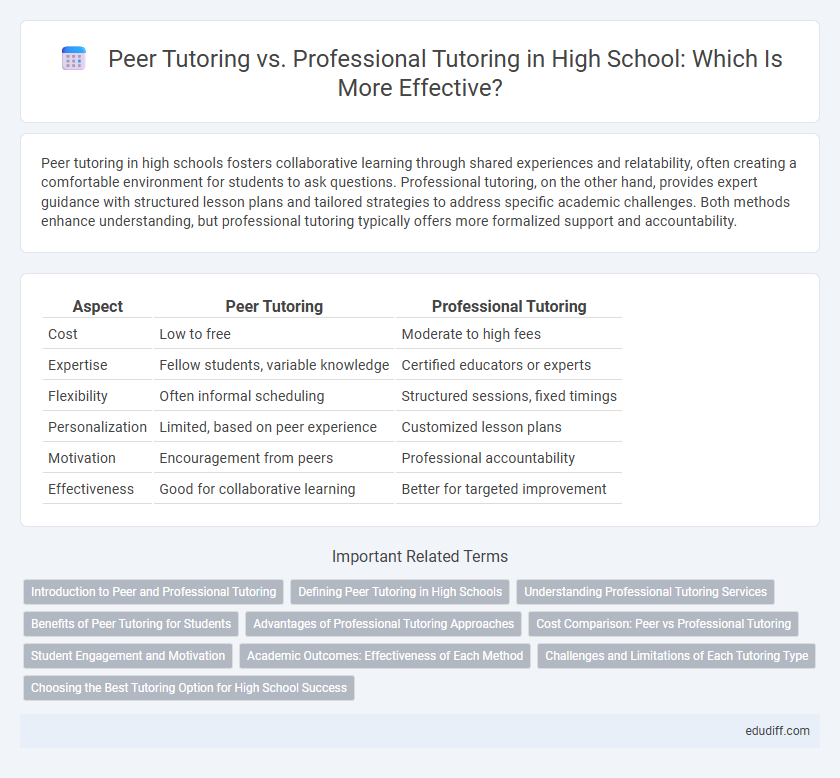Peer tutoring in high schools fosters collaborative learning through shared experiences and relatability, often creating a comfortable environment for students to ask questions. Professional tutoring, on the other hand, provides expert guidance with structured lesson plans and tailored strategies to address specific academic challenges. Both methods enhance understanding, but professional tutoring typically offers more formalized support and accountability.
Table of Comparison
| Aspect | Peer Tutoring | Professional Tutoring |
|---|---|---|
| Cost | Low to free | Moderate to high fees |
| Expertise | Fellow students, variable knowledge | Certified educators or experts |
| Flexibility | Often informal scheduling | Structured sessions, fixed timings |
| Personalization | Limited, based on peer experience | Customized lesson plans |
| Motivation | Encouragement from peers | Professional accountability |
| Effectiveness | Good for collaborative learning | Better for targeted improvement |
Introduction to Peer and Professional Tutoring
Peer tutoring in high schools involves students helping fellow classmates understand course material, fostering collaborative learning and reinforcing knowledge through relatable explanations. Professional tutoring, on the other hand, consists of trained educators or specialists who provide structured, personalized academic support based on expertise and pedagogical strategies. Both methods aim to improve student performance, but peer tutoring emphasizes peer interaction while professional tutoring focuses on expert-guided instruction.
Defining Peer Tutoring in High Schools
Peer tutoring in high schools involves students teaching and assisting their classmates in academic subjects, fostering collaborative learning and reinforcing subject comprehension through relatable communication. This approach promotes social interaction, boosting confidence and motivation among both tutors and tutees while developing leadership and communication skills. Contrasting with professional tutoring, peer tutoring typically occurs in informal settings and relies on peer-to-peer support rather than licensed educators or external experts.
Understanding Professional Tutoring Services
Professional tutoring services in high schools provide personalized, curriculum-aligned instruction delivered by certified educators or trained specialists with expertise in specific subjects. These services often include diagnostic assessments to identify individual learning gaps and tailor lesson plans for targeted academic improvement. Unlike peer tutoring, professional tutoring offers structured schedules, consistent progress tracking, and strategies backed by educational research to enhance student understanding and performance.
Benefits of Peer Tutoring for Students
Peer tutoring in high schools enhances student learning by fostering collaborative skills and reinforcing subject knowledge through teaching. It offers a cost-effective, accessible support system that promotes confidence and motivation among peers. This approach cultivates a comfortable learning environment where students engage actively and personalize their educational experience.
Advantages of Professional Tutoring Approaches
Professional tutoring provides personalized learning strategies tailored to each high school student's unique strengths and weaknesses, enhancing subject comprehension and academic performance. Certified tutors bring subject-matter expertise and experience with diverse learning styles, ensuring efficient problem-solving techniques and exam preparation. Access to structured curriculum and ongoing assessments through professional tutoring results in measurable progress and higher standardized test scores.
Cost Comparison: Peer vs Professional Tutoring
Peer tutoring offers a significantly lower cost option for high school students, often being free or involving minimal fees compared to professional tutoring, which can range from $30 to $80 per hour. Cost efficiency makes peer tutoring accessible for families on a budget, while professional tutoring provides specialized expertise at a premium price. Schools increasingly promote peer tutoring programs to reduce expenses while supporting academic achievement.
Student Engagement and Motivation
Peer tutoring in high schools often enhances student engagement and motivation by creating a relatable and supportive learning environment where students feel comfortable asking questions and collaborating. Professional tutoring provides expert guidance and personalized instruction, which can boost motivation through targeted strategies and measurable progress. Both approaches positively impact academic performance, but peer tutoring uniquely fosters social interaction and confidence among students.
Academic Outcomes: Effectiveness of Each Method
Peer tutoring in high schools enhances academic outcomes by fostering collaborative learning and reinforcing subject comprehension among students, often leading to improved grades and increased engagement. Professional tutoring, provided by certified educators or experts, delivers tailored instruction and targeted strategies that address individual learning gaps more efficiently. Research indicates that while professional tutoring yields higher achievement gains in complex subjects, peer tutoring promotes sustained motivation and social learning benefits.
Challenges and Limitations of Each Tutoring Type
Peer tutoring in high schools often faces challenges such as inconsistent knowledge levels, limited teaching experience, and potential social dynamics that may hinder effective learning. Professional tutoring, while providing expert knowledge and structured guidance, can be costly and less accessible to all students, sometimes leading to scheduling conflicts and reduced personalization. Both tutoring types struggle with ensuring student motivation and sustained engagement over time, impacting overall academic progress and retention.
Choosing the Best Tutoring Option for High School Success
Peer tutoring offers relatable explanations and fosters collaborative learning, making it a cost-effective choice that encourages communication skills and confidence among high school students. Professional tutoring provides expert guidance tailored to individual learning styles and curriculum standards, often leading to higher academic achievement in subjects like math, science, and language arts. Evaluating factors such as budget, subject difficulty, and personal learning preferences is essential in selecting the most effective tutoring option to enhance academic success.
Peer Tutoring vs Professional Tutoring Infographic

 edudiff.com
edudiff.com